Review for I, Robot (UK)
Introduction
Isaac Asimov was my gateway into sci-fi literature. He had a way with concepts and ideas, an elegance and finesse that really appealed to me. His history of the future was compelling stuff, and wove together ideas like collective consciousness, galactic civilisations, psychohistory, and of course robots. He may not have been too hot with characterisations, but at the age of ten, I was more interested in the murder mysteries and the machinery, than I was in interpersonal dynamics of literary characters. Robots, Empire, Foundation, it's a body of work that I continue to revisit all these years later, and I'm not alone, as many other authors have expanded on his ideas and added to his legacy. But, Asimov isn't the easiest author to translate to the silver screen. There's that lack of engaging characterisation that I mentioned, and also some of his ideas are just too large, too daunting to even attempt. Even when some of his lesser works have been adapted to film, the results have been disappointing to say the least. Fantastic Voyage ranks as one of the more turgid sci-fi movies I've ever seen, the idea redeemed only by the Inner Space romp, while the less said about the tooth decay inducing Bicentennial Man, the better.
When I first heard about I, Robot, I was in two minds. After all, I, Robot is an anthology of short robot stories, which doesn't really jump up at you with filmic possibility. But then, I heard that it wouldn't be an adaptation, it would be a completely new story, that built on elements of Asimov's work, would reference the short stories, but would be a single narrative in its own right. It would also be a detective story. Asimov's robot detective stories, featuring Elijah Baley, and R. Daneel Olivaw are among my favourite Asimov stories, and a detective movie seemed to me to be the perfect way to honour his legacy. Then I heard that it would be a summer blockbuster starring Will Smith, and the trailer appeared, showing a horde of rampaging robots attacking humans. That seemed to me everything that Asimov's robots weren't. Still, I gave it a chance when it came to the cinema, and contrary to my negative expectations, I loved it… and I hated it. It's been on television a few times since then, and even with a re-watch, I've loved it and hated it simultaneously. I've wanted to buy it since I first saw it, but that hate has always held me back. Not even antipathy can stay my wallet when the two-disc edition is selling for a hair less than four pounds though.
Detective Del Spooner really shouldn't be back at work, not following the trauma that he has just suffered, leaving him plagued by nightmares, and with an irrational hatred of all robots. That's bound to cause friction when he is called to investigate the apparent suicide of Doctor Alfred Lanning. Lanning was the man who created robots, and practically built the whole industry, including the biggest company in the world US Robotics. While Spooner may have an antipathy to robots, he does have a connection to Lanning, which motivates him to investigate. The thing is, he was called by Lanning's hologram, and it seems the Doctor has left him something of a cryptic message. USR assign robot psychologist Susan Calvin to help him, and Spooner's suspicions are raised when it turns out that surveillance footage of Lanning's office is missing, and that the window he apparently jumped through was made of safety glass, and would need excessive force to break, the sort of force a robot would have. But robots are hardwired with the Three Laws, they simply cannot harm humans, or allow humans to come to harm. Yet as Detective Spooner says, laws were made to be broken.
The Disc
Made in 2004, it would be a strange set of affairs if I, Robot presented any problems on DVD, and indeed the 2.35:1 anamorphic transfer is top notch, sharp, clear, detailed, bringing across the vividly designed future world, and the excellent CGI in full clarity. 6 years is an eternity in digital imaging, but I, Robot still looks cutting edge. If we were going to pick nits, it would be the rare moment of moiré over fine detail, and a smidgen of aliasing, but if you want to be rid of those things, get a Blu-ray. My problem with I, Robot's image is the prevalence of product placement, but that's a whole other argument. In terms of audio, you have a choice between DD 5.1 and DTS English, with optional English subtitles. Again there is nothing to complain about with the audio, bringing across the action, effects and music with full clarity, and the dialogue is just as clear.
Extras
Two dual layer discs ought to mean plenty of goodies to enjoy, right?
Disc 1 begins with one of those 'You wouldn't sniff a gusset' anti piracy ads. It's been so long since I've seen one, I actually watched it all the way through instead of skipping. I did skip the trailers that autoplayed for Dodgeball, The Clearing, Garfield 2, Johnson Family Vacation, and The Day After Tomorrow.
Disc 1 gets a horrible, flashing, overexposed main menu screen that actually obscures the menu selections half the time. Also the transitions between menu screens are long and tiresome.
You get three commentaries to go with the film, commentaries that I really only sampled. First director Alex Proyas, and screenwriter Akiva Goldsman speak about the movie, and it's a pretty straightforward track where they talk mostly about the story, although there were some diversions into the making of. It seems they were recorded separately, I certainly didn't hear any interplay.
The second commentary apparently features everyone else, or at least the bulk of the visual effects team and the editor. There's a narrator to introduce each speaker once, but it's best to have the subtitles on for this, as at least that way you know who is speaking throughout. This is one of those tracks to appreciate if you like hearing about green screen.
The third commentary was the isolated music score with comments from composer Marco Beltrami. Naturally it's very gappy, but actually I found this of more interest than the other two tracks, simply because audio commentaries of this sort are quite rare on DVDs.
The Making of I, Robot lasts 13 minutes and is pure EPK stuff, brief, ephemeral and uninformative, but with clips and interviews with the cast and crew.
There is a stills gallery with 30 concept drawings, models, and photos to click through.
Finally on disc 1 there is an Inside Look section that offers 5 more minutes of promotional material for Aliens vs. Predator, Electra and 24 Season 3.
Disc 2's menu screens are just as much hazard to navigation as those on Disc 1. But there is a Play Everything option on the main screen, and play all buttons for each of the five sections on this disc.
You get several featurettes on Disc 2, separated into 5 sections, each one with an introduction from Alex Proyas. Everything has optional English subtitles.
Day Out Of Days: The I, Robot Production Diaries gathers nine featurettes, most of them offering b-roll footage and behind the scenes sneak peeks, and plenty of goofing around testifying to how happy a set it was. In total, these featurettes run to 98 minutes.
CGI and Design probably sells itself. But if you want more, you'll find out about the city, the robots, the one use of miniatures on this shoot, training actors to walk like robots, and mixing and matching live action and CGI. In total you get 34 minutes worth.
Sentient Machines: Robotic Behaviour has seven featurettes under its wing. This section offers a history of robotics in the real world, from the automata of the 18th Century, all the way to the cutting edge research that was taking place 6 years ago when this movie was released. This section runs up to 35 minutes.
Three Laws Safe: Conversations about Science Fiction and Robots has four featurettes. In two of them, screenwriter Jeff Vintar talks about the legacy of robot stories from Mary Shelley's Frankenstein onwards, and the revolution that Asimov's Three Laws brought. Akiva Goldsman, also a screenwriter talks about the film adaptation of I, Robot. Then daughter and agent, Robyn Asimov and Jennifer Brehl talk about the man behind the stories. These last 31 minutes in total.
The Filmmakers Toolbox is where you will find 4 deleted scenes running to 7 minutes in total, and all those CGI before and after wotzits from the likes of Digital Domain, Weta Digital and Rain Maker. These run to 14 minutes.
If you can brave this disc's navigation, you may find some Easter Eggs located within. I found about 5.
I, Robot is one of those releases that have you questioning the usefulness of all these Special Editions, packed to the gills with extra features, which usually mean chucking in everything including the kitchen sink. I have trouble seeing the use of recording an audio commentary before the film is even released, and I prefer by far commentaries on classic films, which have had the time and space for a public reception and critical appraisal. As for the featurettes, if you like looking at green screen, and actors wearing wetsuits and ping-pong balls, then the modern movie featurette is for you. Once you've seen one CGI featurette, you've seen them all, and watching a computer geek moving pixels around a screen is nowhere near as interesting as all those miniature makers, special effects wizards, and make up artists of old. The movie making process has become monotone in recent years, and while the films may be astounding, learning about how they are made is as dull as hearing a Formula 1 World Champion talking about the race that he just won.
Conclusion
I still love and hate this film. It is the oddest reaction to have to a movie, but I have to temper my passion for it with my innate dislike of the Hollywood conveyer belt. This is the quintessential summer blockbuster. It's an action flick with loads of CGI special effects, cheesy dialogue, and a plot structure that is so well worn that it's threadbare. It's a film to take a bucket of popcorn to, to indulge yourself in, and to not have to think about again on your way home. Except that there is a whole lot in I, Robot to think about, if you let yourself. I'm not all too enamoured of the CGI-fests of the summer box office, but even I have to admit that the CGI in I, Robot is so perfect for the film, so well implemented that you quickly forget that it is there and just relish the storytelling. There's never a moment that takes you out of the film, that screams, 'Hey look at me, I'm a special effect, I cost $10 million.' And that especially includes the star of this film, Sonny the robot, brilliant realised and channelling a hundred percent of actor Alan Tudyk's performance.
But it is a Will Smith movie, and Will Smith is the John Wayne of our generation. He plays Will Smith in all the movies that he is in, or minor variations thereof. It's what people buy their cinema tickets to see after all, but nuanced and deep characterisation this ain't. It's also chock a block with cartoon action sequences, whether it's the tunnel chase, or the bike stunt. There's a lot of defiance of the laws of physics here, and it's something that takes me out of a film more and more, the older I get. Then there is the cinematography. What happened to holding the camera still and actually showing the action? The climax of the film, the battle atop the catwalks is obscured by a spinning camera technique that not only hides the action; it also makes me dizzy to watch it. And don't get me started on the utterly blatant product placement that seems compulsory in films now. I'm just glad that it doesn't happen after the spinny cam climax, or I would throw up. That's pretty much why I hate I, Robot.
But the reason I love this film is because it is so faithful to Asimov's work, it's an ode to his robot stories, it's an amazing tribute to his legacy, and I get a thrill every time when I realise that this movie is not about good guys and bad guys, it's not just about big explosions and fantastically expensive action sequence. At heart, this film is about the three laws of robotics, the concepts that drove Asimov's robot stories, and what inspired generations of sci-fi writers and fans.
1. A robot may not injure a human being, or, through inaction allow a human being to come to harm.
2. A robot must obey the orders given it by human beings except where such orders would conflict with the First Law.
3. A robot must protect its own existence as long as such protection does not conflict with the First or Second Law.
It isn't all that surprising of course, as Asimov created the most compelling stories with these laws at their heart. What does surprise me is that the ideas translate so well to the big screen, giving us something a lot more philosophical and intellectual than just your usual summer blockbuster.
Of course there are certain aspects of this film that may have purists scratching their heads, the rampaging robots for one, and Sonny's behaviour for another, which seem to stray beyond the three laws. Again, the film may deviate from the pure concepts of the three laws, but it does so by still remaining scrupulously faithful to Asimov. In one of Asimov's later novels, he bridges the world of robots and the world of Foundation by postulating a Zeroth Law, one that takes precedence even over the three laws. You can read Robots and Empire to find out more, but it is so perfectly echoed in the plot of this film that I get a little tingle just thinking about it. Admittedly Sonny's behaviour isn't pure Asimov, but one of the writers who played in Asimov's sand pit, Roger MacBride Allen created a no-law robot in a book called Caliban, a robot that was activated and then almost immediately accused of murder. While Sonny isn't strictly a no-law robot, the journey that he goes on in this film is remarkably similar to that faced by Caliban in the novel.
Finally, I, Robot is structured just like one of Asimov's classic robot murder novels, with a robot hating detective effectively partnered with a robot to investigate a murder, a murder which against all the three laws, and all the odds, looks as if it was committed by a robot. The script is pretty tight too, with no major plot holes that I can see, and the way it unfolds, the breadcrumbs that are left for the audience to pick up, along with Spooner, really make this film a joy to watch. So there we have it, an intellectual movie wearing the clothing of a summer action flick. I, Robot may just be the world's first dumbsmart movie!
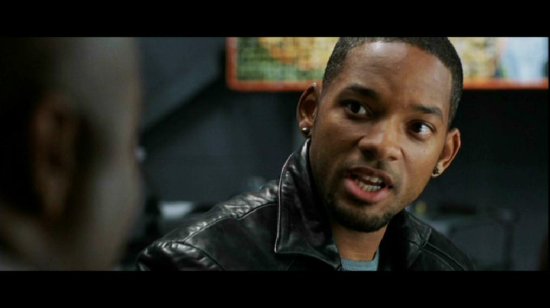
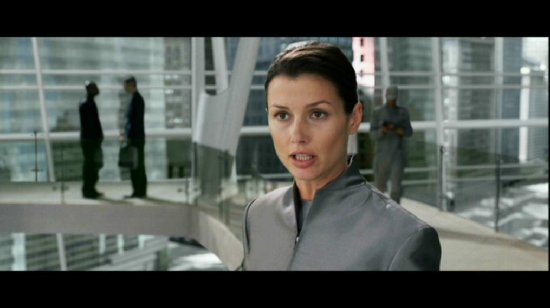
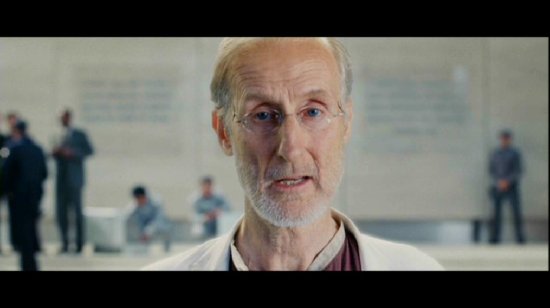
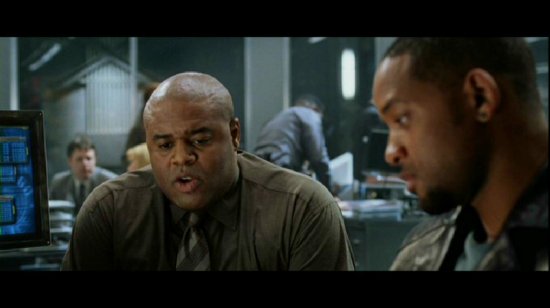
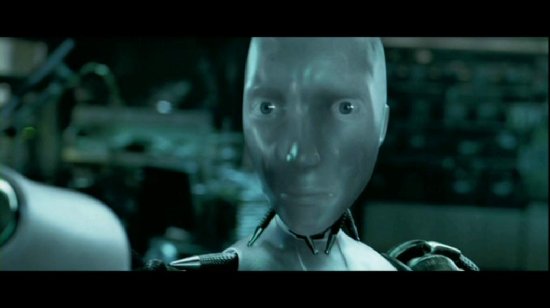
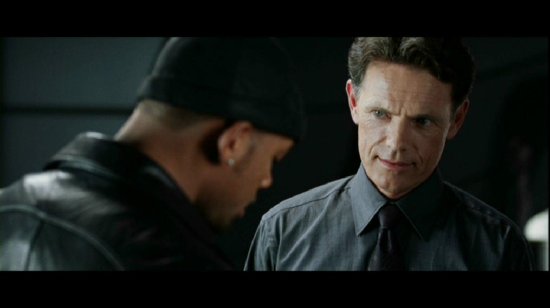

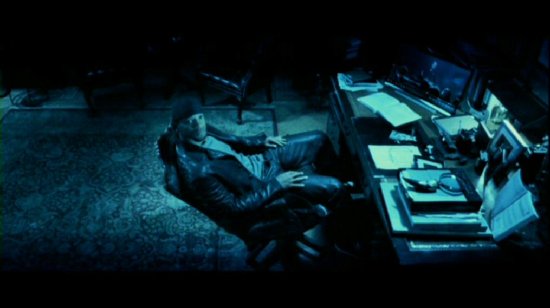
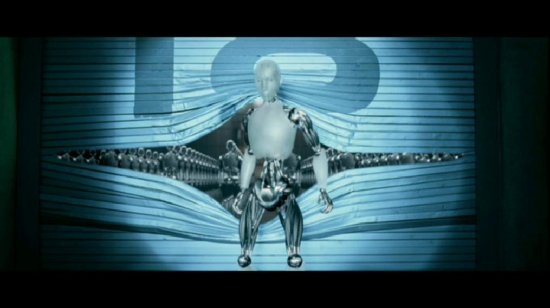
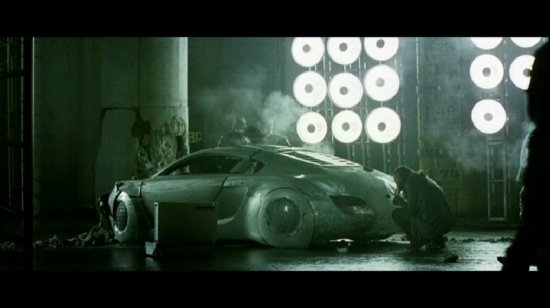
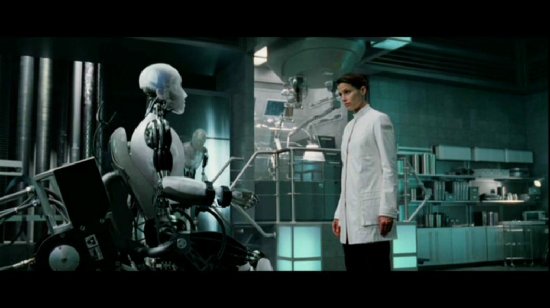
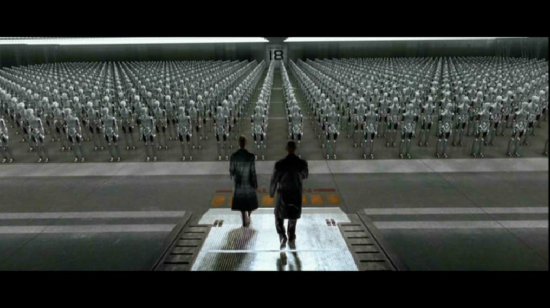
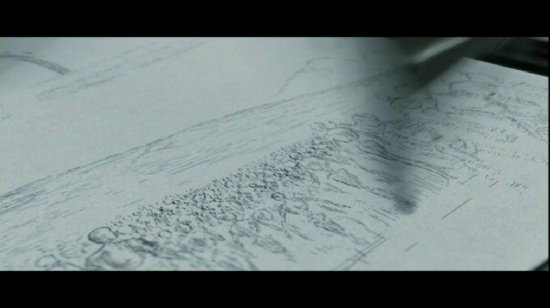

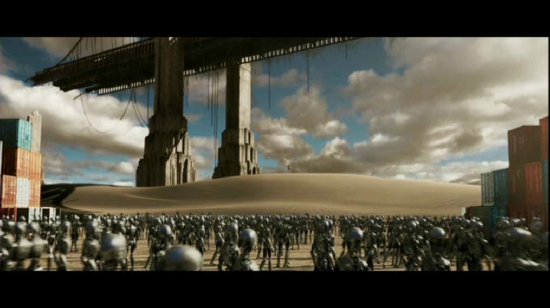
Your Opinions and Comments
Be the first to post a comment!